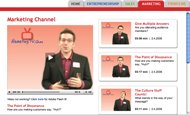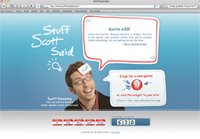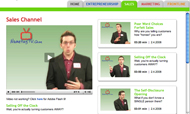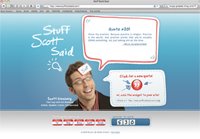 In marketing, there’s ONE WORD that solidifies your failure:
In marketing, there’s ONE WORD that solidifies your failure:
“Next!”
Here’s why:
People say “Next…!” when they cease to see value.
People say “Next…!” when they’ve become hurried, harried or had enough of you.
People say “Next…!” when they’re faced with too many choices and not enough time.
People say “Next…!” when they’ve become tired OF or bored WITH their current option.
Customers. Prospects. Prospective employers. Readers. Followers. Audience members.
Whomever you’re trying to reach with your message. If they either say or think, “Next…!”, here’s the problem…
…That means you’re instantly forgettable.
…That means you’re not inherently competitive.
…That means you haven’t delivered enough value.
…That means you haven’t conveyed enough uniqueness.
…That means you didn’t achieve the Gotta-Have-It Factor.
…That means you’ve created ZERO interest through a Point of Dissonance.
…That means you’re boring, normal, average, or some combination of the three.
…That means the snapshot of your idea hasn’t lodged and exploded in people’s minds.
…That means you didn’t evoke people to slam their fist down on the boardroom table and say, “We need to hire THIS guy!”
Yikes.
SO, HERE’S YOUR CHALLENGE: Practice making yourself, your ideas and your business “unnextable.”
Here’s a list of nine ways to do so:
1. Amuse me or lose me. Diana Krall once recorded a classic jazz tune called, Peel Me a Grape. Here’s how the chorus goes: “Don’t try to fool me, bejewel me. Polar bear rug me, don’t bug me. New Thunderbird me, you heard me. Either amuse me or lose me. I’m getting hungry, peel me a grape.”
Here’s the reality: Attention spans are declining. Technology is accelerating. Choices are infinite. And customers are deciding how much attention they want to give to you. So, if you’re not at least a LITTLE amusing, you’re toast. How amusing are YOU?
2. Anchor your expertise in that which is timeless. You’ll stick around longer. You’ll be hired quicker. And you’ll be relevant forever. Otherwise, your expertise will melt away into the multitude. Just another Marketing One Hit Wonder. What do you know that people will always need to learn more about and get better at?
3. Begin with value. Because if you deliver enough value, you will attract enough attention. If you attract enough attention, you will win enough trust. And if you win enough trust, you will earn enough money. What’s your baseline value?
4. If you give something away, put a price tag on it anyway. This sets a precedent of value. This assures that people recognize the incredible deal you’re giving them. And this prevents other people from violating your boundaries and saying:
“Well, my friend Ted told me you coached him for nothing. I want the same deal.” Remember: You are what you charge. And when people don’t pay you, people don’t hear you. What are you charging?
5. Make yourself necessary to the world. Establish a position where people wouldn’t DARE proceed with (x) until they spoke with you FIRST. A position where organizations wouldn’t explore the topic of (y) until they got your opinion on it FIRST.
And, a position where the media wouldn’t do a story on (z) until they sought out your expertise FIRST. Be necessary. Be impossible to live without. Be impossible to do business without. Are you establishing marketshare or MIND-share?
6. Nothing deserves to be worked on harder than your message. As such, remember to dance across these fine lines: Catchy, but not corny. Clear, yet curious. Cool, but not contrived. Emotional, yet engaging. Informative, yet incomplete.
Also: Philosophical, yet pragmatic. Playful, yet professional. Quirky, but not questionable. Simple, yet profound. Relevant, yet unexpected. Smart, but not clever. Unusual, yet unarguable. How hard are you working on your message?
7. Pick out industries that don’t have celebrities – then become the first one. You will rise to the top quicker. You will stand out easier. And you will be perceived as the expert sooner. Big ponds are overrated. To whom are you a rockstar?
8. Stop brainstorming and start brain MONETIZING. We have enough Idea Guys. What we really need are more Execution Guys. Action guys. GTD Guys. That’s what companies are paying money for: People who DO stuff. Are you a talker or a doer?
9. Your expertise needs to be plugged into strategy needs. My friend, David Newman, used to call his company “Unconsulting.” Which is a cool name, if you ask me. Unfortunately, he realized that companies didn’t have “unconsulting” problems.
So, he changed it to “Do It! Marketing,” because companies DID have marketing execution problems. Do you think he started booking more business as a result? You bet! And all he did was plug his expertise into a different need. How bookable are YOU?
REMEMBER: The more “unnextable” you are, the more successful you will become.
Don’t give people a reason to skip you.
LET ME ASK YA THIS…
How are you preventing your customers from saying, “Next!”
LET ME SUGGEST THIS…
For the list called, “26 Ways to Out-Brand Your Competition,” send an email to me, and I’ll send you the list for free!
* * * *
Scott Ginsberg
That Guy with the Nametag
Author, Speaker, Coach, Entrepreneur
[email protected]
 Who’s telling their friends about YOU?
Who’s telling their friends about YOU?
Tune in to The Marketing Channel on NametagTV.com!
Watch video lessons on spreading the word!

 1. Advance confidently in the direction of your dreams. Progressing towards anything else – graceful as you may look doing so – is a total waste of time, money and energy. Either relentlessly pursue the visions that possess you or go home. What continually deflects you from your certainty of purpose?
1. Advance confidently in the direction of your dreams. Progressing towards anything else – graceful as you may look doing so – is a total waste of time, money and energy. Either relentlessly pursue the visions that possess you or go home. What continually deflects you from your certainty of purpose? Who’s quoting YOU?
Who’s quoting YOU? “Knowledge is power.”
“Knowledge is power.”
 You can’t make people return your calls.
You can’t make people return your calls.
 The world’s FIRST two-in-one, flip-flop book!
The world’s FIRST two-in-one, flip-flop book! FACT #1: The only judgment your people can (honestly) make about you is how interacting with you makes them FEEL.
FACT #1: The only judgment your people can (honestly) make about you is how interacting with you makes them FEEL. You can’t make people retweet you.
You can’t make people retweet you.
 The word “inspire” derives from the Latin inspiraire, which means, “to breathe into.”
The word “inspire” derives from the Latin inspiraire, which means, “to breathe into.”  Consistency – despite convenience and comfort – creates uncracked character.
Consistency – despite convenience and comfort – creates uncracked character. Who’s quoting YOU?
Who’s quoting YOU? 1. Foster customer activity. Especially during long wait times. Giving the customer something to do that enfolds him in the effort and tempers impatience. For example, at Six Flags, they play non-stop cartoons while you wait in 45-minute roller coaster lines. At the Vegas airport, they loop entertaining PSA’s about airport safety starring famous performers like Rita Rudner, Blue Man Group and CarrotTop. What activity could you involve your customers in?
1. Foster customer activity. Especially during long wait times. Giving the customer something to do that enfolds him in the effort and tempers impatience. For example, at Six Flags, they play non-stop cartoons while you wait in 45-minute roller coaster lines. At the Vegas airport, they loop entertaining PSA’s about airport safety starring famous performers like Rita Rudner, Blue Man Group and CarrotTop. What activity could you involve your customers in? The world’s FIRST two-in-one, flip-flop book!
The world’s FIRST two-in-one, flip-flop book!